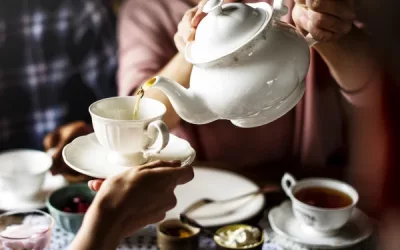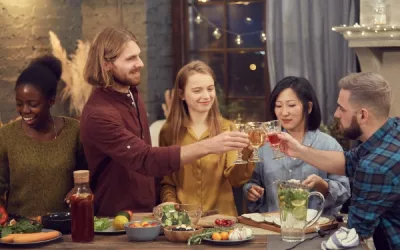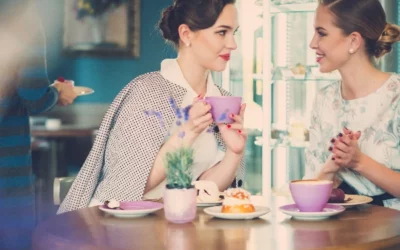Have you ever sipped tea while pondering the rich heritage behind this cherished tradition? Afternoon tea, a delightful blend of culture and community, can be adapted to honour halal dietary laws, making it accessible to Muslim food enthusiasts and event planners alike. With the rise in demand for inclusive dining experiences, exploring halal afternoon tea has never been more relevant. This guide will delve into the origins of halal afternoon tea, offer curated recipes, uncover top venues, and provide essential tips for creating a memorable experience.
Table of Content
- What is halal afternoon tea?
- What are the best halal teas to serve?
- How can I adapt traditional recipes to be halal?
- What are some popular halal afternoon tea venues?
- What are some creative halal afternoon tea recipes?
- How do I create an inviting afternoon tea setting?
- How can I personalise the setting for my guests?
- What are some budget-friendly decoration ideas?
- How can I ensure my afternoon tea is fully halal compliant?
- Conclusion
What is halal afternoon tea?
Halal afternoon tea is a variation of the traditional British afternoon tea experience, tailored to meet the dietary requirements of those who follow Islamic dietary laws (halal). It includes a selection of finger foods, pastries, and beverages that comply with halal standards. Here’s what typically characterizes halal afternoon tea:
1. Halal Ingredients:
- Sandwiches and Savories: Any meat used, such as chicken, beef, or lamb, is sourced from halal-certified suppliers. Pork and any non-halal ingredients are strictly avoided. Common fillings include halal chicken, smoked salmon, or vegetarian options like cucumber and cheese.
- Sweets and Pastries: Cakes, pastries, and scones are prepared using halal ingredients. Gelatin used in desserts, if any, is derived from halal sources, and alcohol-free flavorings are used.
- Scones and Cream: The clotted cream and jams served with scones are free from any non-halal additives.
2. Alcohol-Free:
- All elements of the afternoon tea, including the desserts and any other dishes, are free from alcohol. For example, traditional recipes that call for alcohol (like certain types of fruitcake) are modified to exclude it.
3. Beverages:
- Instead of alcoholic beverages, a variety of non-alcoholic drinks such as halal-certified teas, herbal teas, and fruit juices are offered.
- For those who prefer milk in their tea, halal-certified milk is provided.
4. Cross-Contamination Prevention:
- Special care is taken to prepare halal afternoon tea in a manner that avoids cross-contamination with non-halal foods. This includes using separate cooking utensils, equipment, and storage areas.
5. Presentation:
- While the content is adjusted for halal compliance, the presentation of a halal afternoon tea aims to maintain the elegance and style of traditional afternoon tea. This includes serving the items on a tiered stand and using fine china.
Halal afternoon tea is a delightful twist on the traditional British tea experience, adapted to meet Islamic dietary laws. It embodies the essence of afternoon tea while ensuring all food items adhere to halal requirements.
This concept has grown in popularity among Muslim communities and food enthusiasts who appreciate a delicious, culturally-sensitive experience.
Traditional afternoon tea originated in 19th-century England as a social event, featuring an assortment of finger sandwiches, scones, and pastries, accompanied by tea. Halal dietary laws, which forbid certain foods and require others to be prepared in specific ways, have influenced the creation of halal-friendly versions of these treats.
Cultural adaptations and innovative recipes allow for a rich and inclusive experience. Popular venues now offer halal afternoon tea, combining elegance with respect for dietary needs.
How did afternoon tea evolve into a halal option?
Muslim communities in England and around the world wanted to enjoy the quintessentially British tradition of afternoon tea while adhering to halal dietary restrictions. This led to creative culinary adaptations.
- Traditional afternoon tea includes non-halal foods like pork and alcohol.
- Chefs began exploring halal substitutions, using halal-certified meats and avoiding alcohol-based ingredients.
- Venues started offering halal options due to increasing demand.
- Social media and food blogs played a massive role in spreading the concept.
The evolution of afternoon tea into a halal option reflects a broader trend of cultural integration and respect for diverse dietary preferences.
What are the main components of a halal afternoon tea?
Halal afternoon tea maintains the charm of its traditional counterpart but ensures all ingredients meet halal standards.
- Finger sandwiches with halal-certified meats like chicken or beef.
- Scones served with halal-compliant clotted cream and preserves.
- Pastries and cakes made without any alcohol or non-halal gelatin.
- Tea selections which do not include alcohol-infused varieties.
- Vegan or vegetarian options are often available.
This gives everyone the chance to enjoy a sophisticated and satisfying tea experience.
Why is it important to adapt traditional customs to modern dietary needs?
Adapting traditional customs like afternoon tea to meet modern dietary needs is crucial for inclusivity and cultural respect.
- Everyone deserves to enjoy cultural traditions regardless of dietary restrictions.
- It promotes social harmony and understanding among diverse communities.
- It ensures that traditional customs stay relevant and accessible.
- It encourages culinary innovation and creativity.
- It supports businesses in catering to a broader audience.
These adaptations enrich the cultural tapestry and foster a more inclusive society.
In the early 20th century, the British Raj period saw the fusion of British and Indian cuisines. English households in India started incorporating local flavours and halal ingredients into their meals.
This unique blend laid the groundwork for more inclusive culinary practices. The cross-cultural exchange significantly influenced how traditional British customs, such as afternoon tea, could be adapted to respect local dietary laws and preferences.
What are the best halal teas to serve?
When it comes to hosting or enjoying a halal afternoon tea, selecting the right teas is crucial. Halal teas are those that contain no alcohol or any non-permissible ingredients according to Islamic dietary laws.
Below, I’ve put together a table that outlines some of the best halal teas for your afternoon tea experience. This table includes the tea names, their flavour profiles, health benefits, and the ideal food pairings for each type of tea.
The table is easy to use: simply look at the name of the tea, then move across the row to find out what it tastes like, the health benefits it offers, and which foods pair well with it. This can help you create a delightful and well-balanced afternoon tea menu.
| Tea Name | Flavour Profile | Health Benefits | Food Pairings |
|---|---|---|---|
| Earl Grey | Citrusy, floral | Rich in antioxidants, aids digestion | Scones with clotted cream, lemon cakes |
| Green Tea | Fresh, grassy | Boosts metabolism, improves brain function | Light sandwiches, fruit salads |
| Peppermint Tea | Cool, refreshing | Relieves headaches, aids digestion | Chocolate desserts, cucumber sandwiches |
| Chamomile Tea | Sweet, floral | Calms nerves, aids sleep | Honey cakes, almond biscuits |
| Jasmine Tea | Fragrant, floral | Antioxidant-rich, promotes relaxation | Jasmine-flavoured desserts, light pastries |
| Darjeeling Tea | Musky, spiced | Rich in antioxidants, reduces stress | Cheese scones, spiced biscuits |
| Hibiscus Tea | Tart, fruity | Lowers blood pressure, supports liver health | Tart desserts, fruit tarts |
Earl grey tea
Earl Grey tea, known for its distinctive citrusy and floral notes, is a classic choice. This tea is often flavoured with oil from the rind of bergamot orange, giving it a unique aroma. It’s rich in antioxidants, making it great for your immune system and digestion. It pairs perfectly with traditional scones topped with clotted cream, and lemon-flavoured cakes or biscuits.
- Citrusy, floral flavour
- Rich in antioxidants
- Aids digestion
- Perfect with scones and lemon cakes
Serving Earl Grey tea adds a touch of elegance to your afternoon tea and balances well with both sweet and savoury options. Its delightful aroma and health benefits make it a staple in many households.
Green tea
Green tea brings a fresh, grassy taste to the table. This tea is celebrated for its numerous health benefits, including boosting metabolism and improving brain function. With its light flavour, it’s an ideal companion for delicate sandwiches and refreshing fruit salads.
- Fresh, grassy flavour
- Boosts metabolism
- Improves brain function
- Pairs well with light sandwiches and fruit salads
Green tea is a refreshing choice for those who prefer a lighter, more subtle tea experience. Its health benefits and compatibility with a range of foods make it a versatile addition to your afternoon tea menu.
Chamomile tea has been cherished for centuries, not only for its sweet and floral flavour but also for its calming properties. Int ancient Egypt, chamomile was revered for its healing attributes and was often used to treat fever and pain.
Pharaohs even dedicated chamomile flowers to the sun god, Ra, as a token of their gratitude for the plant’s medicinal benefits.

How can I adapt traditional recipes to be halal?
Adapting traditional recipes to make them halal isn’t rocket science. All it takes is a bit of ingredient swapping and a pinch of creativity. Let’s pull out our culinary wands and give your afternoon tea menu a halal makeover.
First, let’s dissect those classic recipes. Understand the hidden culprits and swap them with halal-friendly counterparts. Think of it as an undercover mission in your kitchen. And, if you’re shaking your head thinking, “Will this still taste the same?” – it sure can! Authentic flavours are all about the right spices and techniques. With a little finesse in presentation, your fancy tea party won’t miss a beat.
What ingredients should be avoided in halal recipes?
Certain ingredients can be a real buzzkill when striving for halal perfection. Keep your eyes peeled for these sneaky non-halal items:
- Gelatine: Often made from pork or non-halal beef. Reach for fish or halal-certified gelatine instead.
- Alcohol: Any form, whether for cooking or flavour. Replace it with flavoured extracts or halal-certified versions.
- Shortening/Lard: Animal fats are a no-go. Plant-based or halal-certified versions work just as well.
- Vanilla Extract: Some varieties contain alcohol. Use alcohol-free vanilla.
- Animal-Derived Broths/Stocks: Opt for vegetable or halal-certified beef/chicken stocks.
Avoiding these common pitfalls ensures your spread can be halal and drool-worthy. This way, you can enjoy your tea knowing it’s TIP-TOP halal.
How can I ensure the authenticity of halal recipes?
Ensuring your recipes stay true to their roots while being halal sounds like juggling cats, but it’s easier than you think. It’s all about quality and authenticity:
- Halal Certification: Always check for certified halal symbols on packaged goods.
- Trusted Sources: Use recipes and cookbooks from reputable authors known for halal cuisine.
- Spices & Herbs: The right blend can retain authentic flavours, so stock up on traditional herbs and spices.
- Cooking Methods: Stick to conventional cooking techniques that define traditional recipes.
- Taste Test: Get feedback from friends and family to ensure authenticity.
By following these guidelines, you’ll have everyone questioning if you’ve actually gone back in time and brought a traditional chef to your kitchen.
What are some easy halal substitutes for common afternoon tea items?
Now, onto the fun part – substituting! This is where you get to be the master chef, making magic with swaps:
- Ham/Smoked Salmon: Go for turkey slices or halal smoked chicken.
- Clotted Cream: Opt for homemade butter or kosher-certified alternatives.
- Eclairs/Cream Puffs: Use halal gelatine for the filling.
- Pâté: Mushroom or lentil pâté works like a charm.
- Wine-based Sauces: Use grape juice or balsamic vinegar.
With these swaps, you’ll keep the traditional afternoon tea spirit alive, sans any halal hiccups.
One of the most splendid examples of adapting tradition for newer needs comes from the Mughals in India. During Emperor Akbar’s reign, the grand feasts typically included a variety of meats and rich gravies – not all were inherently halal.
Understanding his diverse court’s needs, Akbar appointed kitchens to curate recipes that followed halal laws while maintaining the essence of Mughal cuisine. His chefs became experts in substitution, using different herbs, spices, and fruit extracts, setting the culinary stage for what we now know as rich Mughal cuisine.
This historical knack for adaptation proves that with a bit of creativity, maintaining tradition while adhering to specific dietary needs is entirely possible.
What are some popular halal afternoon tea venues?
Finding a spot that serves halal afternoon tea can be a real treat, especially if you’re someone who loves a good cuppa with some tasty bites but wants to stick to halal options. Let’s dive into some of the best spots you can visit, what makes them stand out, and how you can sniff out these places in your own neighbourhood.
Which venues are highly recommended for halal afternoon tea?
Top-rated locations for halal afternoon tea aren’t just about the food – they’re also about the experience. Here are some places that are hitting the mark:
- Cutter & Squidge: Nestled in the heart of London, this bakery offers a fantastic halal afternoon tea experience. Their “Genie’s Cave” theme is a sure hit.
- Mariage Frères: Also in London, known for their extensive tea selection and delicious, halal-friendly sweet and savoury eclairs.
- Berners Tavern at The London Edition: High-class setting with a selection of savoury pastries, all conforming to halal standards.
- Mandarin Oriental Hyde Park: Offering a posh afternoon tea experience, this venue ensures their offerings meet halal dietary restrictions upon request.
- Hummingbird Bakery: Known for their halal treats, their afternoon tea is a delight. Their themed cakes are a crowd favourite.
To make a reservation, you might want to jump on their websites or give them a ring. Most high-end spots require you to book in advance, especially for themed teas. Don’t just stroll in – unless you enjoy disappointment!
How can I find halal-friendly venues in my area?
Finding halal-friendly afternoon tea venues isn’t as tricky as it sounds. The best detective work involves a blend of tech and good old fashion word of mouth:
- Online Resources: Websites like TripAdvisor and Yelp are treasure troves for finding places with halal options. Just type in your locale followed by “halal afternoon tea”.
- Halal Dining Apps: Apps like Zabihah or HalalTrip are like having a pocket-sized friend who knows all the halal-friendly spots.
- Social Media: Instagram and Facebook groups dedicated to halal dining or local foodies can be goldmines for recommendations and reviews.
- Community Recommendations: Don’t underestimate the power of asking around in your community or mosque. Word travels fast when something is worth the hype!
- Restaurant Websites: Always check the official websites or give them a call. They can offer the most accurate and up-to-date information on their halal status.
This is particularly useful when you’re travelling or in a new city. Make sure to prepare ahead so you’re not left high and dry.
Are there any seasonal or themed halal afternoon tea events?
If your cuppa has to come with a dash of festivity or a sprinkle of uniqueness, here are some options that will make your afternoon tea Instagram-worthy:
- Holiday Themes: Around Eid, you can find special halal afternoon tea events tailored to celebrate with lavish sweets and decor.
- British Tradition Themes: Some venues, like Fortnum & Mason, occasionally offer halal-friendly versions of traditional British tea, especially seasonal events.
- Cherry Blossom Tea Events: venues like The Tea Terrace might offer a halal-friendly option during these charming springtime events.
- Vintage-themed Tea: At places like Bettys in York, the charm of vintage tea parties can be experienced with halal-friendly sandwiches and cakes.
- Cultural Festivals: During events like the London Halal Food Festival, you could come across unique pop-up tea experiences that cater to halal requirements.
When it comes to these special events, it’s a good idea to keep an eye on venues’ and event organisers’ social media pages. They don’t always advertise well in advance, and you might miss out on something special!
Back in the day, afternoon tea was more than just an excuse to gorge on sweets – it was a high society affair. Take Anna, the Duchess of Bedford, for instance. In the early 19th century, she turned her daily “snack” during the late afternoon into a social event, and soon the trend caught on amongst the upper classes.
People loved the idea so much that before long, it wasn’t just the deed of a few aristocrats but a nationwide pastime. So next time you sip on your tea and nibble on that scone, remember that you’re participating in a grand old tradition that’s been tailored just right to suit your halal needs.
What are some creative halal afternoon tea recipes?
Alright tea enthusiasts, let’s spill the tea, both literally and figuratively, on making your afternoon tea experience not just halal but also fabulous. It’s time to dive into a world where cucumber sandwiches get a glamorous makeover, desserts become more tempting, and drinks are nothing short of divine.
So let’s make sure your tea table not only respects halal guidelines but also impresses your guests so much that they’ll be snapping pics before they even take a bite.
What are some unique twists on traditional afternoon tea recipes?
You’ve probably had your fair share of plain scones and finger sandwiches, but let’s kick things up a notch. Traditional can be comforting, but a little twist can make your tea party the talk of the town.
- Sandwiches with Sibget: Swap out your regular cucumber sandwich for a smoked salmon and cream cheese delight, but make sure the salmon’s halal. Use dill and a hint of lemon zest to elevate it.
- Spiced Scones: Infuse your scones with cardamom and serve them with rose petal jam. Your taste buds will thank you.
- Mini Quiches: Instead of ham and cheese, go for a spinach and feta quiche. It’s mouth-watering and looks fancy on your tiered stand.
- Halal Chicken Sliders: Use succulent grilled chicken with a hint of chilli and avocado for a little zing.
- Mango Chutney Spread: Add a dollop of sweet and spicy mango chutney to savoury tea sandwiches for a surprising twist.
Elevating traditional tea recipes adds a flavourful and memorable touch to your event.
How can I make my afternoon tea more visually appealing?
We eat with our eyes first, right? Your food presentation can make or break your afternoon tea. Think of it like setting the stage for a blockbuster show – a little glamour goes a long way.
- Coloured Eclairs: Use natural food colourings to tint your eclairs and top them with vibrant fruit glazes. They’re not just tasty but stunning.
- Edible Flowers: Garnish your dishes with edible flowers. They add a pop of colour and a touch of sophistication.
- Tiered Stands: Layered stands give height and dimension to your table setting. Plus, it offers a beautiful display of your various treats.
- Themed Napkins and Plates: Matching your napkins and plates with a cohesive theme makes the table look put together.
- Clear Glassware for Drinks: Serve your drinks in clear glassware so the beautiful layers of the beverages can be appreciated.
These tips will ensure your guests are ‘oooh-ing’ and ‘aaah-ing’ before they even take a sip or bite.
What are some quick and easy halal recipes for busy hosts?
We get it, hosting can be nerve-wracking, especially when you want everything to be perfect in little to no time. Fear not, here are some easy-peasy recipes that are big on flavour but low on fuss.
- Stuffed Dates: Fill Medjool dates with a mix of cream cheese and almonds for a quick, sweet treat.
- Halal Turkey and Cranberry Sandwiches: Use halal turkey slices with cranberry sauce for a festive, no-cook option.
- Fruit Tartlets: Buy pre-made tart shells and fill them with vanilla pudding and fresh fruit on top.
- Minted Yogurt Dip: A refreshing yogurt dip with fresh mint, served with crudités, is both quick and healthy.
- Lemonade with a Twist: Jazz up your lemonade by adding fresh basil and sliced strawberries.
These recipes ensure you spend less time stressing in the kitchen and more time enjoying the company of your guests.
Once, back in the 19th century, Anna, the Duchess of Bedford, found herself famished between lunch and the late evening dinner. She had her staff sneak her a pot of tea and some snacks into her room. This later turned into a daily ritual where she invited her friends to join.
Voila! The concept of afternoon tea was born. Just like Anna’s creative solution to hunger, you too can add your flair to make an ordinary afternoon extraordinary.
How do I create an inviting afternoon tea setting?
When it comes to creating an inviting afternoon tea setting, it’s all about the vibe. The ambiance you set can make or break the experience. Think of yourself as the master of ceremonies—every detail matters, from the table settings to the background music.
Your goal? To make your guests feel like they’ve stepped into an exclusive tearoom, minus the pretentiousness. So, let’s get cracking on setting that perfect scene!
Picture this: a beautifully set table, soft lighting, and some soothing background tunes. These elements together create a cosy, relaxed environment where you can’t help but feel pampered. Here’s how you can nail it:
Table Settings
Your table setting is the first thing guests will notice. A properly laid-out table sets the tone.
- Elegant tablecloth: Opt for something subtle yet classy, like a lace or pastel-coloured tablecloth.
- Fancy crockery: Go all out with your best teacups, saucers, and teapots. Trust me, chipped china is a no-no.
- Napkins and napkin rings: Cloth napkins add that upscale feel. Pick napkin rings that match your theme.
- Cutlery: Ensure you have enough, including dessert forks and spoons.
- Centrepieces: Fresh flowers are a classic, but you could also use candles or a stylish arrangement of fruits.
Decoration Ideas
Decor is where you can really let your creativity shine. From minimalist to extravagant, there’s a style for everyone.
- Floral arrangements: Keep it simple with a few elegant bouquets or go full-on garden party.
- Candles and fairy lights: These add warmth and a magical feel to your setting.
- Mini chalkboard signs: Use them to label different teas or treats.
- Seasonal touches: Incorporate elements like autumn leaves, winter pinecones, or spring blossoms.
Lighting
Lighting can make your setup glow—literally. The right lighting creates an inviting and intimate atmosphere.
- Natural light: If possible, set up near windows to let in natural light.
- Soft lighting: Use lamps or fairy lights to create a warm glow.
- Colour scheme: Stick to a consistent colour scheme that complements your overall theme. Soft pastels are always a winner.
Music
The right playlist can elevate the mood in an instant. You don’t want your setting to feel like a nightclub, but rather a serene tearoom.
- Instrumental classics: Think piano or string quartets.
- Jazz standards: Timeless tracks from the likes of Ella Fitzgerald or Louis Armstrong.
- Modern acoustic: For a laid-back vibe, choose some soft acoustic covers of popular songs.
- Ambient soundtracks: Gentle nature sounds can also add a relaxing touch.
Guest Engagement
Nobody wants to be bored at a tea party. Interactive elements help guests feel more involved and entertained.
- Interactive games: Think charades, Pictionary, or tea-themed trivia.
- Tea tasting: Offer a variety of teas and let guests sample and vote for their favourites.
- Photo corner: Set up a small area with props for guests to take fun pictures.
- Guest book: Have a book where guests can write messages or share their favourite tea-time moments.
Now that we’ve set the stage for the atmosphere, let’s talk about personalisation. How do you make your guests feel uniquely special at your tea party?
How can I personalise the setting for my guests?
Nothing screams “I care” like a personalised touch. Tailoring your afternoon tea to your guests’ likes and needs makes the occasion memorable. It’s the difference between a good event and an unforgettable one.
Name Tags and Place Cards
A small touch that goes a long way in showing you care.
- Customised name tags: Create elegant name tags for your guests. You can even add a small personal note.
- Place cards: Ensure everyone knows where to sit. Use beautiful calligraphy or printed cards.
Personalised Menu
Who can resist a menu tailored just for them?
- Favourite teas: Know your guests’ favourite teas and make sure you have them in stock.
- Dietary needs: Cater to any dietary restrictions or preferences. Include options like gluten-free, vegan, and, of course, halal treats.
- Special treats: If you know a guest loves a specific type of dessert, have it on hand.
Themed Decor
Customise your decorations to reflect the interests or hobbies of your guests.
- Sports fanatics: Incorporate subtle nods to their favourite sports team.
- Bookworms: Mini book-themed decorations can be charming.
- Travel enthusiasts: Use maps or travel-themed props.
Custom Invitations
Even before the day of the event, start personalising with the invitations.
- Handwritten invites: These show effort and thoughtfulness.
- Digital touches: Go digital with a beautifully designed e-invite that reflects your theme.
- R.S.V.P. options: Make it easy for guests to confirm their attendance and dietary preferences.
Guest Souvenirs
Let your guests leave with a little something to remember the day by.
- Personalised teacups: A small, elegant cup with their initials or a meaningful date.
- Keepsake boxes: Fill them with a small selection of teas.
- Photo prints: Take instant photos during the event and give them as a keepsake.
Budget constraints? No worries. You don’t need to break the bank to create a magical afternoon tea setting. Some of the best ideas come with zero price tag.
What are some budget-friendly decoration ideas?
Trying to create an inviting setting on a shoestring budget? Totally doable. After all, it’s the thought that counts, right? Let’s explore some wallet-friendly yet charming decorating ideas that won’t leave you eating beans on toast for the rest of the month.
DIY Decorations
The do-it-yourself route not only saves money but adds a personal touch.
- Homemade bunting: Use old fabric scraps or even paper to create charming bunting.
- Origami flowers: Craft paper flowers in various colours—not only budget-friendly but also long-lasting.
- Hand-painted signs: Use chalkboards or old frames to create signs for your tea table.
- Mason jar centrepieces: Fill jars with freshly picked flowers or even fairy lights.
- Upcycled items: Repurpose old jars and bottles as vases or candle holders.
Nature’s Bounty
Take advantage of what Mother Nature offers for free!
- Fresh flowers: Pick them from your garden or a nearby park.
- Leaf garlands: String together leaves for an earthy table runner.
- Pinecones and acorns: Collect these and use them as rustic decorations.
- Twigs and branches: Spray paint them for an elegant woodland theme.
- Peebles and stones: Gather them to create simple, earthy centrepieces.
Affordable Purchases
Certain budget-friendly items can make a big impact.
- Fairy lights: Inexpensive and versatile, they can be hung or placed in jars.
- Paper decorations: Paper lanterns and pom-poms are colourful and cheap.
- Second-hand finds: Thrift stores often have hidden gems like vintage teacups or tablecloths.
- Fabric remnants: Use them as cloth napkins or small tablecloths.
- Candles: Affordable and set the right mood when paired with simple holders.
Digital Delights
Go digital for some decorative elements.
- Printables: Download free printables like banners, tags, and labels.
- Digital frames: Use a screen to display a rotating slideshow of themed images.
- QR codes: Create codes linked to a special playlist for guests to enjoy.
Repurpose What You Have
You probably have more at home than you think.
- Old sheets as tablecloths: They can be spruced up with a bit of creativity.
- Existing crockery: Mix and match your current collection for an eclectic look.
- Books and trinkets: Use them as part of your table setting.
- Old picture frames: Repurpose them to display event themes or menu options.
- Scarf runners: Use colourful scarves as table runners.
Long before tea became an afternoon delight, it was a symbol of high society and luxury. In 1662, Catherine of Braganza popularised tea in England when she married King Charles II. With her love for tea, the custom spread through the British court and beyond. So while you sip your perfectly curated halal afternoon tea, remember, you’re partaking in a centuries-old tradition started by royalty. Cheers!
How can I ensure my afternoon tea is fully halal compliant?
So, you want to ensure your afternoon tea has that halal stamp of approval? Smart move, my friend. Ensuring everything adheres to halal standards is like putting together a well-choreographed orchestra – every element has to tick the box. Let’s break down the key steps, shall we?
First off, you’ll need to source halal ingredients. Picture this: it’s like finding the Holy Grail but for foodies. You want meats and products blessed by the all-mighty halal certification gods.
Check labels, ask awkward questions at your local deli, and maybe even get friendly with your butcher – friendships have been built on less. Understanding halal certifications can make your life a lot easier. They’re your North Star guiding you to safe consumption.
Cross-contamination? Avoid it like you’d avoid your ex at a party. Clean your kitchen and tools thoroughly. Trust me, rogue bacon crumbs or stray pork chops can spoil your day. And while you’re at it, informing your guests about halal practices can go a long way – it’s like sharing the recipe for your secret sauce, only more meaningful.
What should I look for when purchasing halal products?
Buying halal products isn’t rocket science, but it’s not a walk in the park either. Here’s what you should be on the lookout for.
- Halal Certification Logos: Look for credible seals like the Crescent-M or Halal Food Authority.
- Ingredients List: Scan for forbidden items like gelatine, alcohol, or any sneaky E-numbers.
- Butcher Verification: Ensure your meats come from a certified halal butcher.
- Product Traceability: Find out where it was sourced. Transparency helps.
- Expiry Dates: Freshness is key. Nobody likes a stale cake, halal or otherwise.
Knowledge is power, and when you know what to look for, you’ll glide through grocery stores like a pro.
How can I educate my guests about halal compliance?
Okay, so now you’re ready to throw the most righteous halal afternoon tea. What next? Educate your guests. Think of it as a public service announcement about your fabulous, fully-halal shindig.
- Invitations: Clearly state that all food will be halal-compliant.
- Information Sheets: Print out cute, easy-to-read sheets explaining what halal means.
- Verbal Briefing: As guests arrive, give them a quick halal 101 – it’ll make them appreciate your efforts more.
- Menu Cards: Highlighting the halal ingredients can be a real eye-opener.
- Q&A: Be open to questions. Knowing you’ve got the deets will put everyone at ease.
By educating your guests, you’re not only ensuring they enjoy the food, but also broadening their culinary horizons.
What are the consequences of not adhering to halal standards?
Picture inviting your vegan mate round and slipping bacon bits into a salad. The fallout isn’t pretty, right? It’s the same for halal. Not adhering to halal standards can have some serious consequences.
- Guest Discomfort: Your guests may feel disrespected or uncomfortable.
- Health Concerns: Consuming non-halal food can be distressing for those strictly following halal.
- Reputation Damage: Imagine being the host known for flopping on such an important detail.
- Legal Implications: In worst-case scenarios, it could violate certain event policies or business regulations.
- Personal Accountability: You’ll have to live with the knowledge that you didn’t honor your guest’s dietary needs.
The stakes are high, but if you follow through, you’ll nail it every time.
Back in the day, during the reign of Sultan Abdul Hamid II of the Ottoman Empire, halal compliance wasn’t just a household affair – it was state policy. The Sultan made sure every meal served in the royal court adhered to rigorous halal standards, employing food inspectors who would chant prayers while overseeing the kitchens.
Imagine the Sultan’s court, with its rich Ottoman décor, every dish meticulously halal, the Sultan himself probably thinking: “I’ve got this down better than anyone will in the 21st century.”
So, you’re in good company. If the Sultan could oversee a halal banquet, your afternoon tea will be a breeze.
Conclusion
As I reflect on the intricacies of Halal Afternoon Tea, I find it fascinating how this beloved cultural tradition can evolve and adapt to meet modern dietary needs while still honouring its roots.
Throughout the article, we have explored the essence of Halal Afternoon Tea, from its origins and significance within the halal dietary framework, to the rich tapestry of flavours offered by various halal teas.
Each cup served is a reminder of the importance of inclusivity in gastronomy, allowing everyone, regardless of dietary restrictions, to partake in shared moments of joy and connection.
The compelling journey to create a halal afternoon tea experience emphasises not only the delicious potential of adapting classic recipes but also the need to be mindful of ingredients and preparation methods.
By choosing halal-certified products and being aware of cross-contamination, we uphold the values that matter most. As we gathered ideas for unique recipes and venues, it became clear that people crave not only sustenance but also a sense of community—a gathering where traditions can be celebrated without compromise.
So, what comes next? If you are inspired to host your own halal afternoon tea or explore local venues, consider the pillars we’ve discussed: ingredient selection, thoughtful pairings, and an inviting atmosphere.
Are there celebratory themes waiting to be explored in your area? The potential for creativity is boundless—why not put your twist on traditional offerings or even venture out to discover new halal-friendly locations?
In closing, let us remember the profound words of the renowned author and food enthusiast, Alice Waters, who said, “Food is the common ground, a universal experience.”
With Halal Afternoon Tea, we have the opportunity to create that common ground, enriching our experiences through every sip and bite shared. So, I invite you to reflect on how you might contribute to this evolving tradition and the beautiful moments that good food can inspire.
Resources
- Antioxidant mechanism of tea polyphenols and its impact on health benefits
- Molecular mechanisms underlying health benefits of tea compounds
- Advances and challenges in conventional and modern techniques for halal food
- Recent advances in halal food authentication: Challenges and opportunities
- The Importance of Halal Food and Its Legality in Both Muslim and Non-Muslim Communities
- Global & Indian Perspectives on Halal Food: Balancing Tradition and Modernity
- Tea – The Nutrition Source







